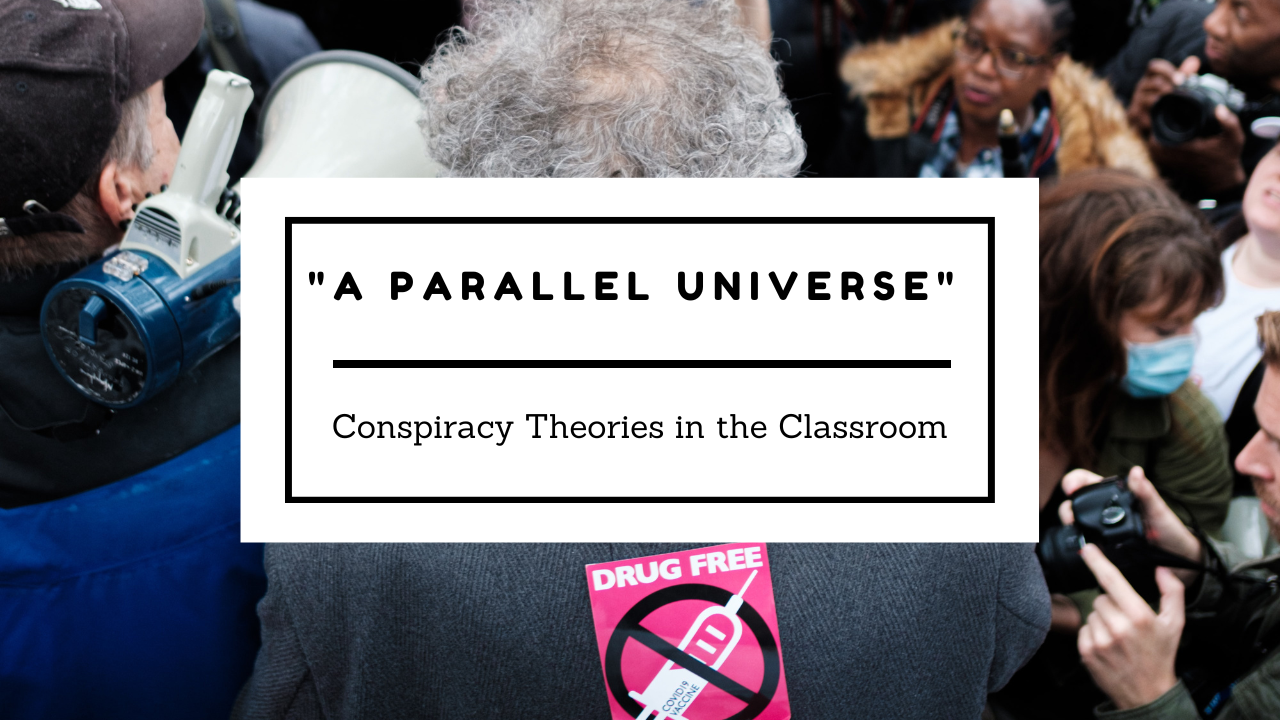 Snapshot: Conspiracy theories play an increasingly important and often highly problematic role in political debates in liberal democracies. As a student at a German high school becomes deeply immersed in the world of conspiracy theories in the wake of the Covid-19 pandemic, his teachers struggle to both counteract the negative effects that his contributions to classroom discussions have on other students and support him via dialogical and educational means. How should teachers respond when students get lost in the parallel universe of conspiracy theories?
Snapshot: Conspiracy theories play an increasingly important and often highly problematic role in political debates in liberal democracies. As a student at a German high school becomes deeply immersed in the world of conspiracy theories in the wake of the Covid-19 pandemic, his teachers struggle to both counteract the negative effects that his contributions to classroom discussions have on other students and support him via dialogical and educational means. How should teachers respond when students get lost in the parallel universe of conspiracy theories?
Case description: Conspiracy theories are on the rise around the globe and can be found at the center of both academic and public debates. Alongside this renaissance of conspiracy theories, schools and teachers have been facing manifold challenges. While educators don’t wish to shy away from engaging in debates about politically controversial topics, they also don’t want to give up on basic discursive norms that ensure sufficiently reasonable and civil discussion in the classroom. What should teachers do when conspiracy theories breach the classroom walls?
“A Parallel Universe: Conspiracy Theories and the Limits of Education” centers on a Peter, a 16-year-old student whose immersion in the world of conspiracy theories has left him utterly disconnected from reality. His social studies teacher Mrs. Faulkner hates to see her former star pupil pulled into this alternate world, but all of her attempts to help Peter see the truth are falling flat. Moreover, his false beliefs are converting some classmates and causing others pain. How should she respond?
This case study examines the different educational challenges schools and teachers face in counteracting the negative effects of conspiracy theories—both on the student stuck in a parallel universe and and on their classmates. What are the limits of controversiality in the classroom? Can it ever be legitimate to shut a student down or even write him off as a lost cause? How can teachers live up to the ethos of discussing controversial political issues when dealing with conspiracy theories? How should they deal with students that no longer seem to be open to rational arguments?
Additional Resources:
-
Click here to download a reader's theater script for this case.
-
The Querdenker-movement mentioned in the case is a mixture of individuals with varying political leanings, including right-wing extremists, who either radically doubt that Covid-19 exists or believe that it’s all part of a big conspiracy initiated by Bill Gates and others. On the Querdenker movement, see: Reichardt, Sven (ed.) (2021): Die Misstrauensgemeinschaft der “Querdenker”. Frankfurt am Main: Campus. For an English-language overview of the origins of the Querdenker movement, check out Anna Sauerbrey’s opinion piece from the New York Times.
-
Recent research suggests that one of the reasons why people adopt conspiracy theories is that they find it entertaining to engage with them: Van Prooijen, Willem/Ligthart, Joline/Rosema, Sabine/Xu, Yang (2021): The entertainment value of conspiracy theories. In: British Journal of Psychology
-
For the psychological mechanisms, such as `confirmation bias´ or the `backfire effect,´ underlying this tendency of conspiracy theorists to immunize their views against critique, see: Van Prooijen, Jan-Willem (2018): The Psychology of Conspiracy Theories. London, New York: Routledge.
-
In December 2021, German authorities arrested "a conglomerate of conspiracy theorists" accused of plotting to overthrow the German government, illustrating the influcence that such theories have in the country. As journalist Jorg Schmitt pointed out, "It would be too easy to write these people off as crazy, as a weird bunch of conspiracy theorists, people who we don’t need to take seriously … But that would be naive. Some of the 52 accused of planning a military system overthrow in Germany come from the middle of society, they are teachers, doctors, business people. People who you’d normally expect to be pillars of democracy."

